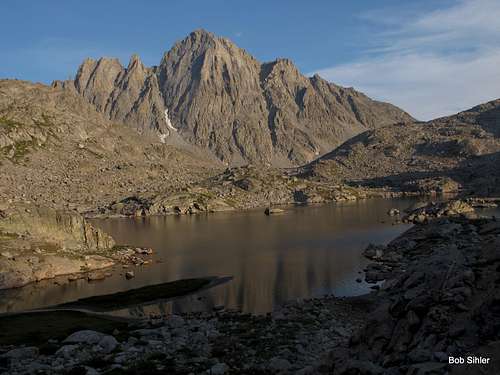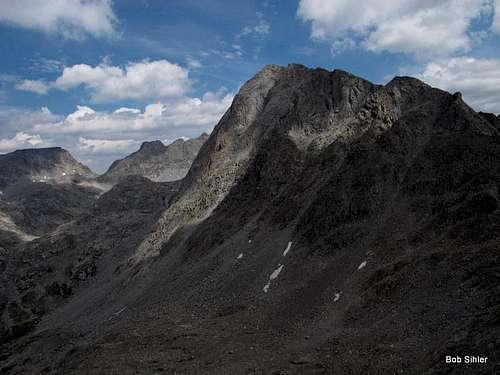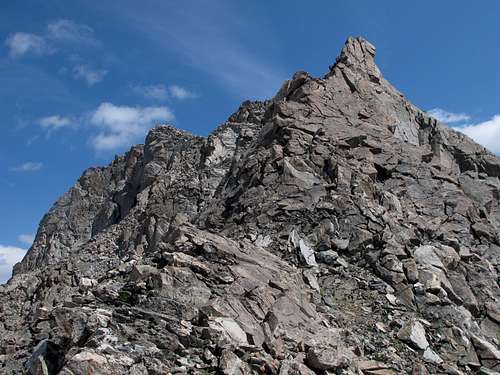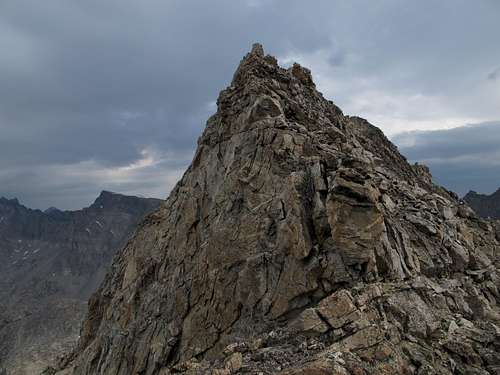-
 5306 Hits
5306 Hits
-
 77.3% Score
77.3% Score
-
 8 Votes
8 Votes
|
|
Route |
|---|---|
|
|
43.09360°N / 109.5959°W |
|
|
Scrambling |
|
|
Summer |
|
|
One to two days |
|
|
Class 4 |
|
|
Overview
In addition to hosting the North Arete, one of the area's classic routes, Ellingwood Peak has a fine Class 3-4 scrambling route accessible from Island Lake or from Indian Basin. Sections of the upper ridge get pretty exposed, and sometimes some route-finding skills are necessary in order to avoid Class 5 or impassable terrain, but this route, which will take most people about half a day to complete (from base camp) is well worth the effort and the risks for the fun and for the views.
This is also the typical descent route for those doing the North Arete or other technical routes on the peak.
Getting There
Near the south end of Pinedale, turn east onto a signed road for Fremont Lake. Drive 14-15 miles to reach the Elkhart Park Trailhead.
For specific details, please see Bill Reed's page for Elkhart Park.
Route Description
RT distance from Island Lake is about 5 miles, with around 1800' of elevation gain. Total RT distance from the trailhead is around 26 miles, so this is an overnighter for all but the fastest parties.
Start from Elkhart Park, about 9400', and hike 10.5 mi to Island Lake, about 10,400'. While this sounds like one of the world's easiest backpacking approaches, it is more strenuous than it sounds, for the route does not ascend a drainage or other naturally ascending line but rather has several dips and reclimbs that make the total elevation gain closer to 2000' (still not that bad but frustrating nevertheless). And the first 5 miles are almost exclusively extremely dull hiking through lodgepole pine forest with no views of anything except more lodgepole pines.
Although there are several trail junctions along the way, with a good map and decent reading comprehension, you will not have trouble following the correct route.
Where you camp is up to you based on your itinerary. Island Lake makes a good base camp because routes to Titcomb Basin, Indian Basin, and other areas nearby all branch out from it.
There are two different means of trail approach to the peak from Island Lake. One is via the trail through Indian Basin. The other is from an unsigned but well-trodden trail climbing along an inlet of Island Lake. The inlet and trail are on the southeast side of the lake; the trail climbs steeply and disappears in less than a mile.
Your goal is the saddle between Elephant Head and Ellingwood. From Island Lake, it's easier to reach using the second approach described above because it doesn't involve a descent and then regaining elevation.
From the saddle, work your way across Class 2 and 3 terrain to another saddle, this one at the base of Ellingwood's SW ridge.
Now it's up to you. Climb and scramble up Class 3 and 4 ground and make a short drop to another saddle below the ridge proper. Then follow the ridge to the summit. Sticking to the crest the whole time would be a Class 5 undertaking; but stay on the crest as much as you can to maximize the fun and the views. When things get too exposed or difficult, easier ground is found below and to the right.
There used to be a good cairned route to follow along the ridge, and you might read about it in online trip reports, but don't count on finding it. I took it upon myself to dismantle every cairn I saw, finding their presence on such a remote peak to be an eyesore and an insult. Go ahead and hate on me for that if you like.
Essential Gear
There's enough loose rock here to warrant a helmet, especially if you have a partner.






